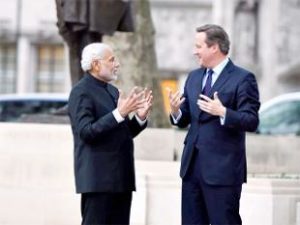 Giving the much needed reforms impetus to the economy, Prime Minister Narendra Modi-led NDA government on Tuesday announced Foreign Direct Investment (FDI) reforms in as many as 15 sectors.
Giving the much needed reforms impetus to the economy, Prime Minister Narendra Modi-led NDA government on Tuesday announced Foreign Direct Investment (FDI) reforms in as many as 15 sectors.
According to the government’s release, “The crux of these reforms is to further ease, rationalise and simplify the process of foreign investments in the country and to put more and more FDI proposals on automatic route instead of government route where time and energy of the investors is wasted.”
These FDI reforms are set to benefit sectors such as agriculture and animal husbandry, plantation, defence, broadcasting, civil aviation and manufacturing. “Further refining of foreign investments in key sectors like construction where 50 million houses for poor are to be built. Opening up the manufacturing Sector for wholesale, retail and e-Commerce so that the industries are motivated to Make In India and sell it to the customers here instead of importing from other countries,” the release added..
The proposed reforms also enhance the limit of Foreign Investment Promotion Board (FIPB) from current Rs 3,000 crore to Rs 5,000 crore. The proposal also contains many other long pending corrections including those being felt by the limited liability partnerships as well as NRI owned companies who seem motivated to invest in India. Few other proposals seek to enhance the sectoral caps so that foreign investors don’t have to face fragmented ownership issues and get motivated to deploy resources and technology with full force.
India got FDI of $19.39 billion in the April-June period, according to government data, up 29.5% over the year earlier. The Modi government has been pushing hard to drum up overseas investment, easing FDI regulations in various sectors including the railways, medical devices, insurance, pension, construction and defence.
Last week, ET had reported that the government plans to launch a series of policy reforms, signalling its intent to get moving again on economic changes and putting the Opposition on notice before Parliament convenes for the winter session.
Key to the Narendra Modi government’s renewed development push will be power, labour and infrastructure, three senior government officials had told ET. Among the highlights are a revival package for power distribution companies, freeing up labour rules and a possible push for the railways, ET had said in its report.
The road map for the phasing out of corporate tax exemptions and reduction in the tax rate to 25% is being drawn up. Besides this, the Startup India, Standup India plan and the rollout of the National Investment and Infrastructure Fund (NIIF) are also being worked on.
A simpler foreign direct investment (FDI) policy, further easing of the external commercial borrowing (ECB) regime and changes in the public-private partnership (PPP) framework to attract more private investment could also announced.
Source: http://economictimes.indiatimes.com/articleshow/49735873.cms





